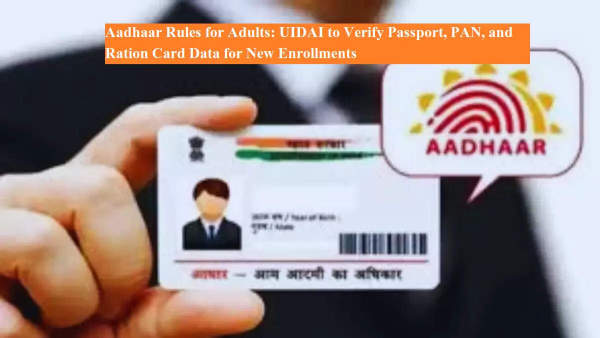
New Aadhaar Enrollment Rules: Adults to Face Stricter Verification via PAN, Passport, Ration Card and More
In a major shift aimed at enhancing the security and authenticity of Aadhaar enrollments, the Unique Identification Authority of India (UIDAI) has introduced more stringent verification protocols—especially for adults applying for Aadhaar cards for the first time. As part of these reforms, the UIDAI will now cross-check information through multiple official databases, including those linked to passports, PAN cards, ration cards, birth certificates, and matriculation certificates. This move is designed to ensure that only eligible and verified individuals receive this critical form of identification.
For years, Aadhaar has served as a universal identity proof in India. However, due to rising concerns around identity fraud, fake documentation, and its misuse by illegal immigrants, UIDAI has overhauled the process to filter out any discrepancies in identity verification. According to UIDAI, the focus is now on granting Aadhaar numbers only to those individuals who meet the strict eligibility and documentation norms.
The revised process will involve online verification of documents, leveraging real-time access to government databases. This will reduce dependency on physical verification alone and enhance the credibility of the Aadhaar system.
As per Section 9 of the Aadhaar Act, Aadhaar is not to be considered a proof of citizenship or nationality. Despite this, the Indian government is taking proactive steps to ensure that only genuine Indian residents—and not unauthorized foreigners—are granted Aadhaar numbers. This distinction is becoming increasingly important in light of previous incidents where illegal immigrants managed to obtain Aadhaar using forged documents.
UIDAI’s verification system will now validate information from various digital sources, including birth and matriculation certificates, thereby creating a two-layer security check during both Aadhaar enrollment and data updates.
Over the past 15 years, India has issued over 1.4 billion Aadhaar cards, making it one of the world’s largest biometric ID systems. However, a significant number of these cards now belong to deceased individuals. With the Aadhaar system expanding and being integrated into various aspects of governance and finance, the government’s attention has shifted toward tightening issuance for new adult applicants.
This new scrutiny is especially focused on first-time adult applicants, ensuring that their identity is indisputable and their documentation aligns with government records.
The government has acknowledged reports that illegal immigrants have previously obtained Aadhaar cards using fraudulent documents. To prevent recurrence, states have been assigned the responsibility to rigorously verify all submitted documents. Aadhaar cards will now be issued only after state portals validate the applicant’s credentials.
This policy aims to close the loopholes previously exploited by unauthorized individuals to not only secure Aadhaar but also get their names added to voter rolls or access welfare schemes. The government has made it clear that Aadhaar will not be allowed to become a backdoor channel to obtain Indian citizenship or electoral identity.
To strengthen the enrollment system further, UIDAI has developed a new digital tool for secondary document verification. This mechanism will validate supporting IDs such as driving licenses, MGNREGA job card data, PAN cards, and even utility bills like electricity records. The verification process will comply with central KYC (Know Your Customer) standards, ensuring consistency and reliability in identification.
The introduction of these reforms represents a major step toward protecting the integrity of the Aadhaar ecosystem. With cross-checks becoming mandatory and real-time data validation being prioritized, it’s evident that UIDAI is moving towards a more secure and tamper-proof Aadhaar issuance process.
While these changes may make the Aadhaar enrollment process more time-consuming for new adult applicants, they are essential to maintaining the trustworthiness and legal sanctity of India’s most important digital identity document. As the government continues to digitize and secure its identity frameworks, only those with authentic, verifiable documentation will be able to access the benefits linked to Aadhaar.